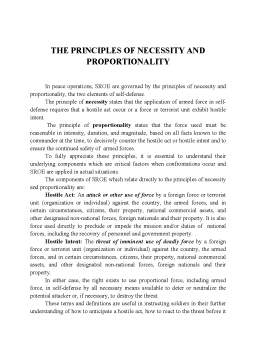Extras din referat
The ROE are directives issued by competent military authority that explain the circumstances and limitations under which armed forces initiate and continue combat engagement with opposition encountered.
The ROE reflect the requirements of the law of war, operational concerns, and political considerations when military force shifts from peace activities to combat operations and back to the peace phase of an operation.
These requirements are the primary means the commander uses to convey legal, political, diplomatic, and military guidance to the military force for handling the crisis in peacetime.
THE PRINCIPLES OF NECESSITY AND PROPORTIONALITY
In peace operations, SROE are governed by the principles of necessity and proportionality, the two elements of self-defense.
The principle of necessity states that the application of armed force in self-defense requires that a hostile act occur or a force or terrorist unit exhibit hostile intent.
The principle of proportionality states that the force used must be reasonable in intensity, duration, and magnitude, based on all facts known to the commander at the time, to decisively counter the hostile act or hostile intent and to ensure the continued safety of armed forces.
To fully appreciate these principles, it is essential to understand their underlying components which are critical factors when confrontations occur and SROE are applied in actual situations.
The components of SROE which relate directly to the principles of necessity and proportionality are:
Hostile Act: An attack or other use of force by a foreign force or terrorist unit (organization or individual) against the country, the armed forces, and in certain circumstances, citizens, their property, national commercial assets, and other designated non-national forces, foreign nationals and their property. It is also force used directly to preclude or impede the mission and/or duties of national forces, including the recovery of personnel and government property.
Hostile Intent: The threat of imminent use of deadly force by a foreign force or terrorist unit (organization or individual) against the country, the armed forces, and in certain circumstances, citizens, their property, national commercial assets, and other designated non-national forces, foreign nationals and their property.
In either case, the right exists to use proportional force, including armed force, in self-defense by all necessary means available to deter or neutralize the potential attacker or, if necessary, to destroy the threat.
Preview document
Conținut arhivă zip
- Consequences of Breaking Rules of Engagements.doc















